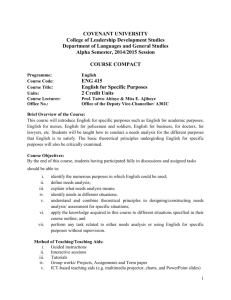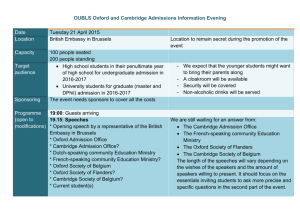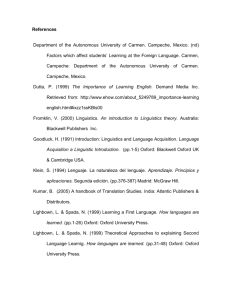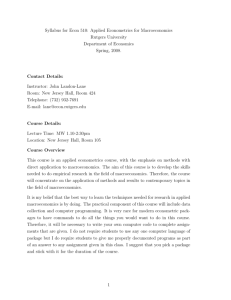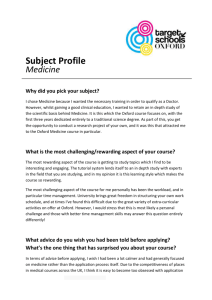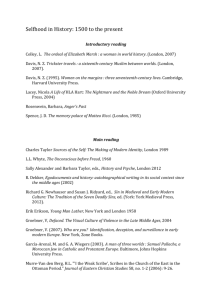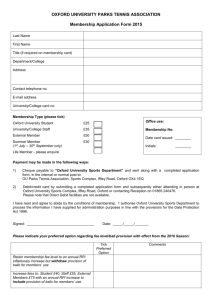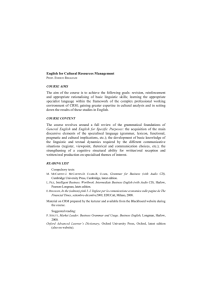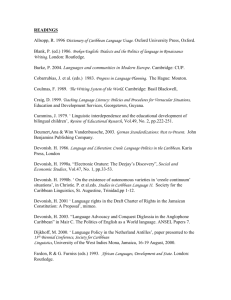File - Sookmyung TESOL MA
advertisement
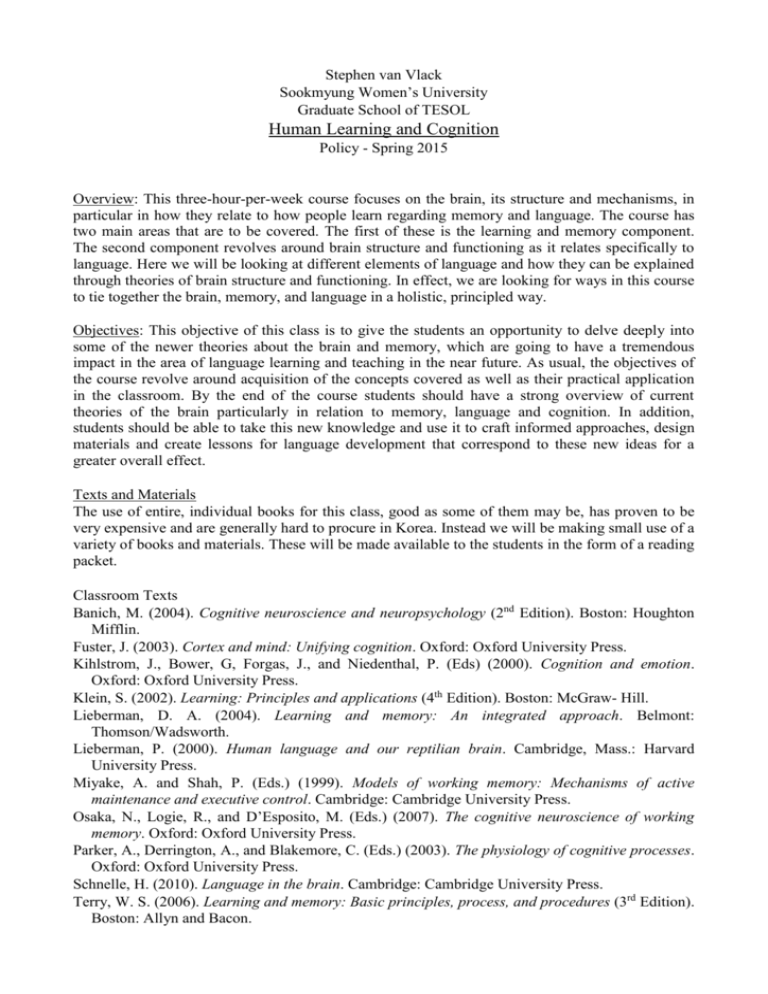
Stephen van Vlack Sookmyung Women’s University Graduate School of TESOL Human Learning and Cognition Policy - Spring 2015 Overview: This three-hour-per-week course focuses on the brain, its structure and mechanisms, in particular in how they relate to how people learn regarding memory and language. The course has two main areas that are to be covered. The first of these is the learning and memory component. The second component revolves around brain structure and functioning as it relates specifically to language. Here we will be looking at different elements of language and how they can be explained through theories of brain structure and functioning. In effect, we are looking for ways in this course to tie together the brain, memory, and language in a holistic, principled way. Objectives: This objective of this class is to give the students an opportunity to delve deeply into some of the newer theories about the brain and memory, which are going to have a tremendous impact in the area of language learning and teaching in the near future. As usual, the objectives of the course revolve around acquisition of the concepts covered as well as their practical application in the classroom. By the end of the course students should have a strong overview of current theories of the brain particularly in relation to memory, language and cognition. In addition, students should be able to take this new knowledge and use it to craft informed approaches, design materials and create lessons for language development that correspond to these new ideas for a greater overall effect. Texts and Materials The use of entire, individual books for this class, good as some of them may be, has proven to be very expensive and are generally hard to procure in Korea. Instead we will be making small use of a variety of books and materials. These will be made available to the students in the form of a reading packet. Classroom Texts Banich, M. (2004). Cognitive neuroscience and neuropsychology (2nd Edition). Boston: Houghton Mifflin. Fuster, J. (2003). Cortex and mind: Unifying cognition. Oxford: Oxford University Press. Kihlstrom, J., Bower, G, Forgas, J., and Niedenthal, P. (Eds) (2000). Cognition and emotion. Oxford: Oxford University Press. Klein, S. (2002). Learning: Principles and applications (4th Edition). Boston: McGraw- Hill. Lieberman, D. A. (2004). Learning and memory: An integrated approach. Belmont: Thomson/Wadsworth. Lieberman, P. (2000). Human language and our reptilian brain. Cambridge, Mass.: Harvard University Press. Miyake, A. and Shah, P. (Eds.) (1999). Models of working memory: Mechanisms of active maintenance and executive control. Cambridge: Cambridge University Press. Osaka, N., Logie, R., and D’Esposito, M. (Eds.) (2007). The cognitive neuroscience of working memory. Oxford: Oxford University Press. Parker, A., Derrington, A., and Blakemore, C. (Eds.) (2003). The physiology of cognitive processes. Oxford: Oxford University Press. Schnelle, H. (2010). Language in the brain. Cambridge: Cambridge University Press. Terry, W. S. (2006). Learning and memory: Basic principles, process, and procedures (3rd Edition). Boston: Allyn and Bacon. Additional Materials: Students must bring to each class a folder to hold any papers that the instructor gives out. There will be a lot of handouts. Winter Reading Text Ratey, John. (2002). A user’s guide to the brain. London: Vintage Books. Ratey (2002) is an excellent and entertaining introduction to the functions and working of the brain in general, but with special emphasis on psychological issues. (There are two versions of the book running around (an American and a British one) – feel free to get either one of them.) Two other books that I think would be very interesting and helpful as pre-course material are the following. Jensen, E. (2005). Teaching with the brain in mind (2nd edition). Alexandria: ASCD. Willingham, D. T. (2009). Why don’t students like school? San Francisco: Jossey-Bass. Methodology Language Policy: Following the tenets of international educational situations, students are expected to produce all course work in English. This means all assignments, writing, and discussion must be in English. Korean can and should be used appropriately as a means of enhancing and integrating understanding of the course materials, not as a way of avoiding English. Students are expected to follow international standards on language use and sensitivity. Classroom: In the class the students are expected to take an active role in discussions and classwork. This will enable the class to be much more student-centered. Following this we will try to use a small portion of class time for lecture and much larger proportion of the time should be used for activities and discussion. To do this, however, students need to come to class well prepared. How the classroom runs is directly dependent on the students and their level of preparation. Please bear this in mind. Attendance: Students are expected to attend all scheduled classes and to be fully prepared when they do so. Failure to attend 2 or more classes, or to come to class less than fully prepared as evidenced by one’s lack of effective participation, will result in a significantly lower grade. If students know that they are going to be absent in advance they are requested to contact the instructor in advance. Assignments: In addition to the regular reading assignments, which are essential for effective participation in the class, there will also be written homework or various kinds given each week. All homework, unless specifically stipulated, must be typed and handed in on the day it is due. Students should expect a fair bit of written work to do for this class. Winter Reading Project: The winter project is due on March 13th (Week 2). It basically revolves around reading Ratey (2002) writing up responses to the text. The basic purpose of this is to give students a basic introduction to some of the general concepts we will be going over in the class. Midterm Project: The midterm project is due on May 1st (week 9). It will take the form of a project and there will be several different options that students can choose from. Specific information about each of the options will be released in due time. It is generally seen as an initial and somewhat rough draft of what will be done for the final project. Final Project: The final project will be a continuation of the midterm project. It should be done alone and is due on June 13th. Grades: Final grades will be based on performance in the following categories. Class Participation Assignments 35% Midterm Project Final Project 25% 25% 15% Instructor - Stephen P. van Vlack Office – Haengpa Faculty Building 206 Tel. 2077-7761 E-mail: vxvlack@gmail.com There is also a web site to accompany this course. The address is: http://www.udveksling.com It is important that you go there periodically to post messages/inquiries on the web board and to get assignments and class summaries.


